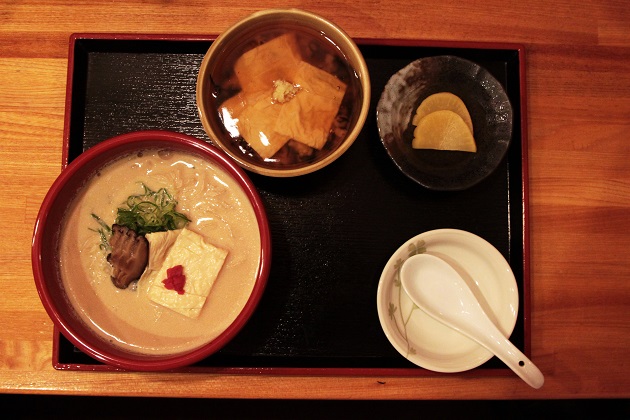
Interview with Chef Minoru Yonekawa
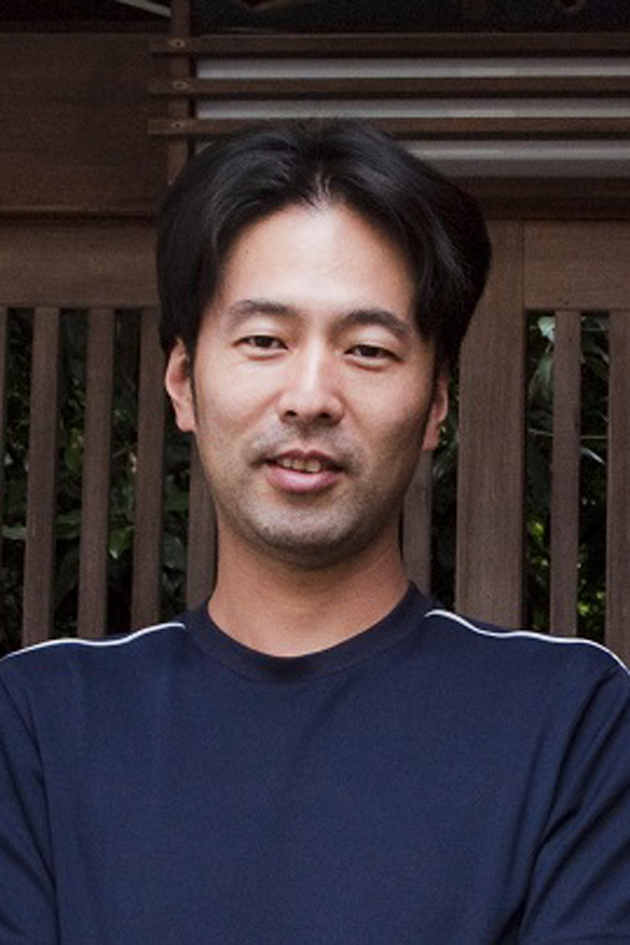
Mamezen is an unusual soymilk ramen restaurant tucked away in the quiet Shimogamo suburbs in Kyoto. Minoru Yonekawa is the chef behind this one-man operation, and he's on a mission to bring Japanese culture to the world. We visited him to find out more about his craft and his plans for the future.
Interview, translation: Florentyna Leow
Transcription: Kyoko Manita
What prompted you to start making soymilk ramen?
Minoru Yonekawa (Yonekawa)I was a chef at a yudofu (tofu hot pot) restaurant in Kyoto for 10 years, and at the time one of our most popular items on the off-season menu was soymilk ramen. There are many excellent ramen shops concentrated in Ichijoji, and since I really like ramen and often eat it, I decided to start making my own.
So, hang on, backtracking a little… what is 'Kyoto' ramen?
YonekawaThere are generally three types: tori-assari, a thick, chicken-based kind; se-abura shoyu, a shoyu-based broth with pork back fat; and ton-assari shoyu, a light, shoyu-based pork broth. A lot of other places already do 'kotteri' (rich, thick) ramen, and chains like Tenka Ippin are especially famous for their Kyoto-style 'kotteri' ramen. People from other prefectures have this notion that Kyoto flavours are quintessentially light and subtle, but oddly enough for a scenic place like Kyoto, what's popular here is the rich, thick kind. With this in mind, I wanted to create a more 'Kyoto-style' ramen, one that would suit the image that people have of Kyoto.
When the question of Kyoto's famous foods crops up, the answer is usually 'yudofu'. I was working in a yudofu restaurant, so I thought it appropriate that a soymilk ramen aiming to be representative of Kyoto would be born out of that tradition.
Did you open the soymilk ramen shop while continuing your work at the yudofu restaurant?
YonekawaThe main season for eating yudofu is during autumn and winter, and the rest of the time is off-season. We only had lunch hours, and dinnertime was reservations-only. Using that spare time, I opened a restaurant dedicated to soymilk ramen and marketing research for that ramen.
How long ago was that?
YonekawaIt was 9 years ago that I started serving soymilk ramen at this 'hidden' restaurant in Shimogamo. But it was 13 years ago, around 2000, that I began serving it at the yudofu restaurant. At the time no one else was serving soymilk ramen, so you could say I invented the world's first soymilk ramen.
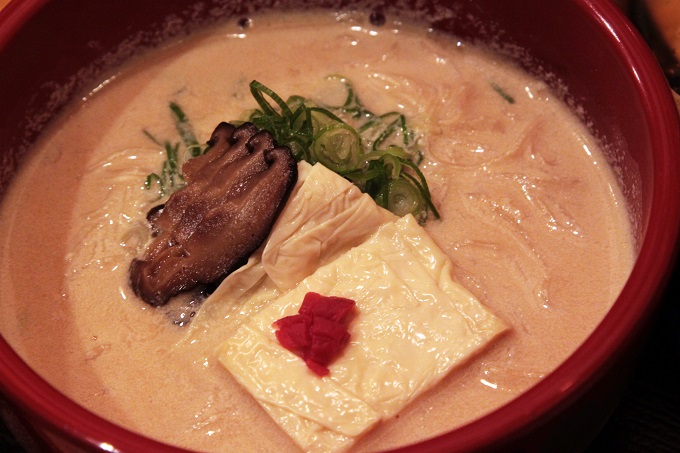
Do you have any particular requirements when it comes to ingredients?
YonekawaIn Zen we have the word 'chisoku', which means 'to know that all is sufficient'. Taking the same Zen approach used in shōjin ryōri to make soymilk ramen, it's not so much about being particular, but more about being grateful and appreciative of a meal which was made possible by nature's gifts and the efforts of many people.
However, I do make it a point in the case of kelp to use "Rishiri kelp" which is frequently used in Japanese fine dining restaurants.
That's domestically produced, right?
YonekawaKelp harvested from Rishiri Island in Hokkaido is often used in Japanese cuisine and Kyoto cooking. From kelp measuring about 20m long from the ocean floor, the highest quality kelp is from the roots, and you can only harvest that once. The further up the kelp you go, the lower the price becomes. Nevertheless, I use the kelp harvested from the root portion quite lavishly in making the soup for my soymilk ramen.
Do you have any other preferences, for instance for the type of bonito flakes you use?
YonekawaFor bonito flakes, certainly. Before I used a variety called 'mejika' to make the broth used in yudofu. However for my broth I use a mix of fish flakes such as sardine and mackerel, the type of broth you would use in making soba or udon.
Any particular reason?
YonekawaWell, in shōjin ryōri you don't use animal products. But it might not be good for business to take such a strict approach to things, so I went ahead and used dried fish flakes. I used a mix of bonito, sardine and mackerel fish flakes to create a rich, slightly complex broth with depth to it.
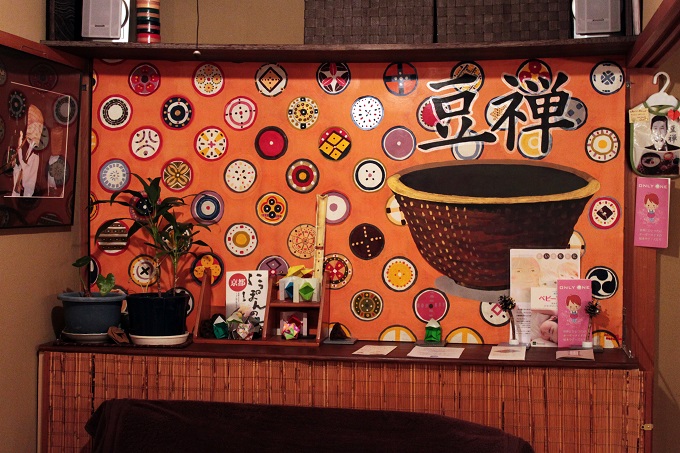
Ramen is normally considered B-class gourmet food, but Mamezen's Kyoto-style soymilk ramen can't really be classified as such, can it?
YonekawaIn one sense, I wouldn't like to classify soymilk ramen as such, yes. I'd like it to be in another class even within the category of ramen. You have Kyoto cuisine in Kyoto, so if I had to choose I'd like it to be somewhere closer to that. Plus, I've had 10 years of experience managing a yudofu restaurant and have a teaching qualification for the bamboo flute, so I can say that, right? In shōjin ryōri you have Dōgen's "Fushukuhanpo" (The Dharma for Taking Food), and it's that kind of spirit which is included in making this ramen.
You've worked in other places before the yudofu restaurant gig. Did you want to do something related to food?
YonekawaYes, before I managed the yudofu restaurant I worked as a waiter at a French restaurant, a manager of a sushi franchise, a bartender at Kiyamachi, etc. Actually, I wanted a job that would allow me to travel around the world. (Laughs) Still, I have this dream of one day opening soymilk ramen restaurants around the world.
Actually, your shop seems to have become rather famous internationally…
YonekawaYeah, the number of diners from overseas talking about my restaurant on their blogs has increased. You have vegetarian people from outside Japan who like ramen, and people who just like a Kyoto-esque atmosphere.
Why did you want to have an international job?
YonekawaWhen I was young, I travelled to Europe and found the food there delicious. But at that time there were only high-class Japanese restaurants, and those that were reasonably priced weren't' very good. And, there was a famous Japanese ramen chain that opened in various European countries, but it was totally different from Japanese ramen. I was really surprised when they did things like serve wine with ramen.
Of course, it's fine to have restaurants that adapt to the local culture overseas, but I want to create an atmosphere that accurately, confidently communicates Japan's 'wa' (Japanese) culture to people overseas.
Soymilk ramen is an enterprise where along with the spirit of 'omotenashi' (loosely, 'hospitality') I try to convey the Japanese Zen culture. Maybe, one day, I can bring this overseas.
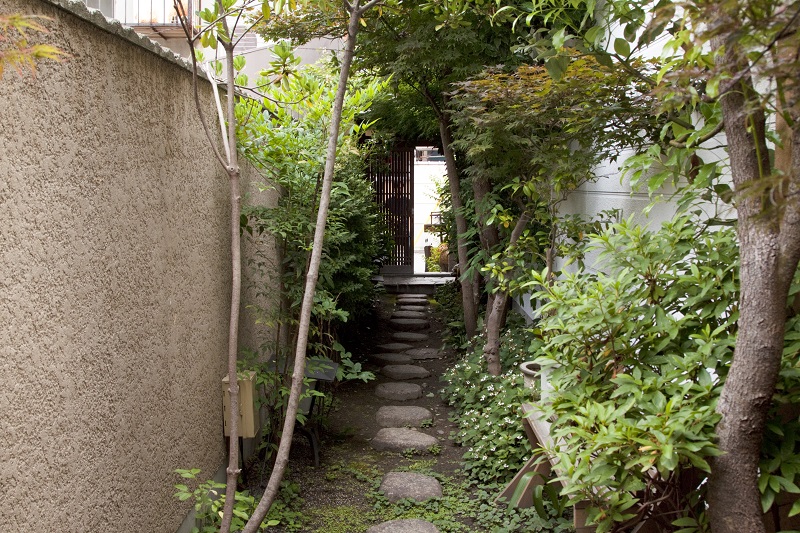
When do you think that will be?
YonekawaHm, when I first opened up this restaurant I had no idea as to exactly when that would be a possibility. But a few years ago, more and more customers from overseas kept telling me to open up a shop in their country. So I think I'm going to, one day… but for that, I need money and connections, so first I'll work on gathering those.
Up till now you've had all kinds of people come to your restaurant, so do you mean you'd use those connections?
YonekawaThat's right, with Facebook it's possible to easily connect with foreigners, so I'm looking to forge connections with customers who come to my restaurant. And, I recently met my best friend from high school after a long while. From his youth he's had this dream of opening a soba shop in France, but while learning the trade he injured his back and had to quit. Now he works at the French-Japanese House, and has a lot of connections in France, so we're working on a plan to open up a restaurant together in France.
In Paris?
YonekawaProbably around Paris. If it takes off in Paris I'd like to open shops in other countries too. From what I've heard from foreign customers, if you open up in Paris or New York and succeed in breaking through, you could open up anywhere in the world. For now, Paris is more of a possibility.In France there seems to be many people who like Japan, Japanese food and even have an interest in Zen, so I guess France looks rather attractive.
Apparently 40% of Mamezen's customers are foreigners. Is that to do with Couchsurfing, or Kyoto Foodie?
YonekawaKyoto Foodie. About 80% to 90% of them found me through his website.
And Kyoto Foodie has guest cheffed here before?
YonekawaThat's right, he has. He brought some good friends who are also chefs to my restaurant. They would come sometimes, and cook up some inspired dishes.
Just for a one night event, he served up a novel sake lees soymilk ramen that took the original a step further. It's okay for all kinds of events to take place here, so they planned, hosted it and took care of everything.
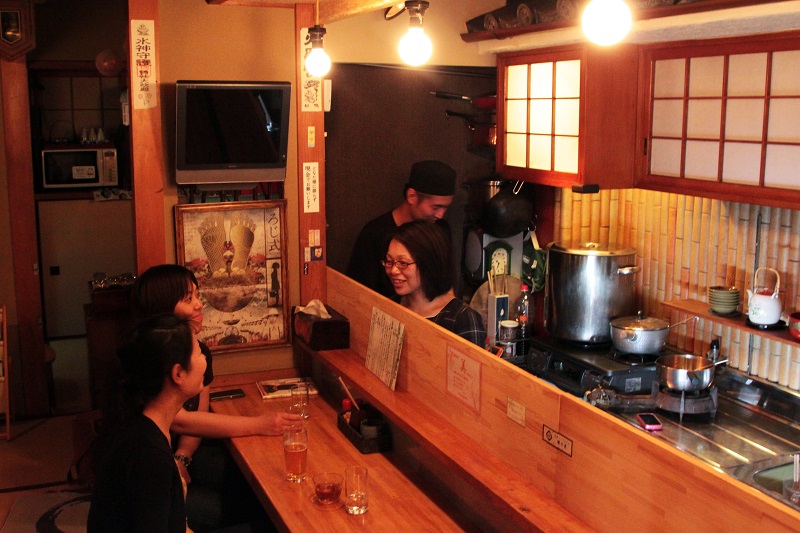
So, Mamezen isn't just a restaurant but also a space where many events take place. Why?
YonekawaI've never spent any money on advertising fees for this restaurant, not for magazines or anything like that. If there are customers who like my soymilk ramen, in exchange for letting them use the restaurant space to host their own events, they'll advertise for me in return, usually by word of mouth. It's a win-win situation.
We also hear that you do Couchsurfing, but why did you start?
YonekawaBecause more and more customers from overseas started coming to my restaurant, there were more and more situation where I've had to deal with customers in English. It's been over 10 years since I was travelling quite frequently overseas, and since I haven't been in an English-speaking environment for a long time my language skills have gotten worse. I wanted to master English quickly, but with work, chores and raising my kids and no time to take language lessons I thought it'd be impossible. At that time, a customer suggested I try Couchsurfing. I asked him and talked to him about it, and the basic premise was that in letting people stay at my place, I would have to communicate in English and in doing so my English would improve. Lately, there's been many people doing that, so I thought it'd be good to try. Japanese people have also stayed at my place so the only difference would be that foreigners would stay here. That being the case I thought it'd be better, so I started hosting on Couchsurfing.
After being registered on Couchsurfing for one or two years I got a little scared and decided to stop. You don't know what kind of people will come to your place, right? But one day I got a message from this group of one Japanese and two or three Hawaiians, saying that "we're going to go to your place even if we don't get a reply. We'll eat at your restaurant, and if we can stay we'd love for you to let us stay." When I read that I thought, 'Aha!' and didn't think they'd would, but they really did come to my restaurant for a face-to-face meeting. The man was a bamboo flute player, and that day he was handing over the bamboo flute he'd made to the two Hawaiians, and wanted to pass it to them at my place. Apparently he knew I played the bamboo flute and because of that thought that I'd be likely to let him stay at my place. And I did let them stay, all the while thinking that it was all quite amazing. At that time, my fears dissipated, and I began to think, I can do this.
The next guest I took in was a Korean lady. My wife's elder sister is married and has kids in Korea, and one day when they're older I wanted to communicate with them. We held Korean language lessons in my restaurant and my wife also participated in those. With that sort of exchange taking place, and taking in Couchsurfers bit by bit, it felt like things were gradually starting. My wife also wants to raise our kids to have a more international outlook, so doing Couchsurfing also creates quite a fun environment for them, I think.
The kids do look like they're having fun.
YonekawaYes, they're only shy at first but once they get used to you they'll warm up to you very quickly.
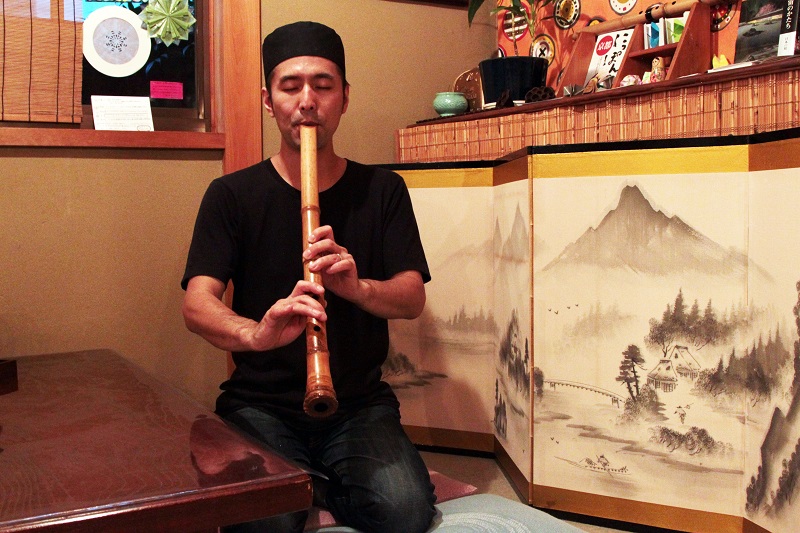
Just now you mentioned that you played the bamboo flute. What got you started on that?
YonekawaWhen I went overseas, I thought it'd be better if I could master at least one aspect of Japanese culture before going. I used to be a trumpet player, and I liked performing. While I was working in the yudofu restaurant, though, and practicing during my breaks, while looking at the garden from the restaurant I realized that the image of me playing the trumpet didn't fit. In the store we had koto, shamisen and bamboo flute music in the background, and out of those three it was the bamboo flute I had an interest in. I'd always wondered what kind of instrument it was and wanted to try it out. By chance, at an acquaintance's wedding ceremony the groom's friend was a bamboo flute performer. It was the first time I'd met someone who could perform, so I approached him and got him to introduce me to his instructor, and now I'm taking lessons from him.
How long ago was that?
YonekawaOver 10 years ago. I'm partially certified to teach, and I have just one student.
Do you have an apprentice for the ramen shop?
YonekawaNo. But it would be nice if I did have one… it's impossible for just one person to open more restaurants overseas, even in Japan, so I'm in the market for one.
So you want this soymilk ramen restaurant, 'Mamezen', to be an international one?
YonekawaYes, indeed. I'd like to be able to open soymilk ramen restaurants overseas along with some aspect Japanese culture, such as 'Zen' or the bamboo flute. Me, I'd run a restaurant and teach the bamboo flute in my spare time. But it doesn't have to be the bamboo flute. It could be calligraphy, ikebana, anything. One of the concepts for opening restaurants overseas would be a place where you can eat soymilk ramen and also learn about Japanese culture.
What do you think about non-Japanese people opening Japanese restaurants?
YonekawaWell… I don't think it's really a good thing. It's true that Japan and its culture are, at the very least, becoming popular worldwide. But if I'm going to have someone run my restaurant, I do think that they would need to have some kind of cultural experiences in Japan even within their cooking. And I would like them to be proficient in some aspect of Japanese culture. Anything, just one would do.
Anything else you'd like to add?
YonekawaI'd like for Japanese people to go overseas to countries they're interested in. Japan is rapidly internationalizing, and there must be quite a few Japanese people who want to go overseas or wonder how they can go about the business of cultural exchange. I'd like to make Mamezen a space which can help make that possible.
I also think it'd be great if I could create a kind of system where Japanese people could stay at an overseas Mamezen, take part in the events at that restaurant and interact with locals. In that way I think Japanese people would be able to go overseas more, and a lot faster. I'd like to open restaurants to open up those kinds of opportunities.
Before, when Japanese people went overseas it was usually on tours. You get on a bus and go to various tourist spots and stay at nice hotels, that kind of thing. But I think that's kind of depressing. If you go overseas, I think it's better if you can experience something closer to everyday life, interact with the locals, go to the restaurants and shops they go to, and stay cheaply for a longer period of time. Just like how Chinatowns can be found all over the world, it'd be great if there were communities that 'exported' all kinds of Japanese culture – with Mamezen at the center! – could be formed all over the world. Is there anyone out there who would like to join me on this journey?
Minoru Yonekawa Profile
Born in Kyoto, January 1st, 1972. After accumulating years of experience working at places like a French fine dining restaurant, sushi restaurant and famous food bars, he worked at the family yudofu restaurant for 10 years as head chef. In 2004 at the age of 32 he struck it out on his own and opened Mamezen, a soymilk ramen restaurant in the Shimogamo neighbourhood of Kyoto. Since appearing on noted food blogger Kyoto Foodie's website, Mamezen has been covered by various food bloggers, TV programs and magazines. For updates on opening times, see Mamezen's Twitter.
